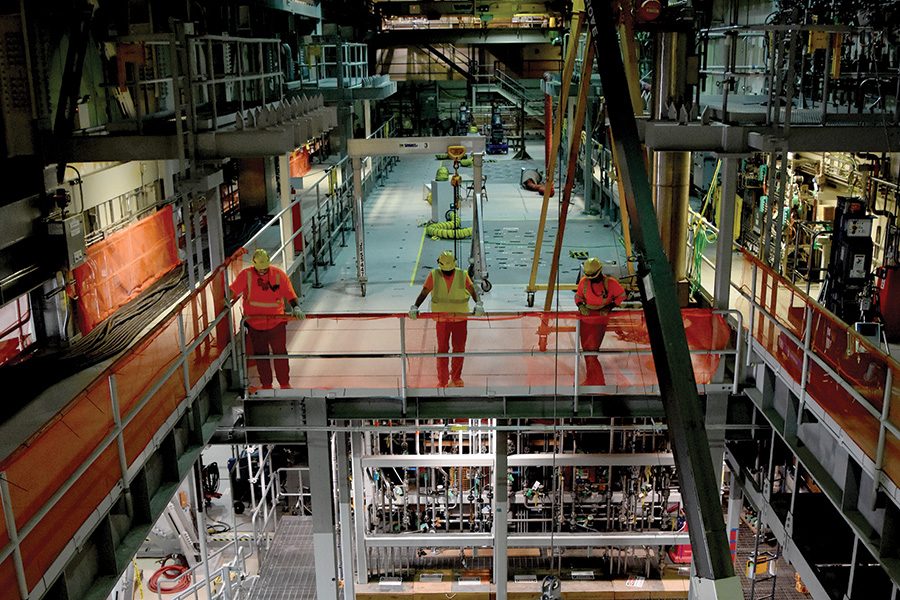
Home » What does a new administration mean for Hanford?
What does a new administration mean for Hanford?

April 16, 2021
What does having a new president in office mean for Hanford?
Specifically, what does it mean to have President Joe Biden, a former vice president and longtime U.S. senator, in the Oval Office? What does it mean to have Jennifer Granholm, the former governor of Michigan, at the helm at the U.S. Department of Energy (DOE)?
Local officials, including Washington’s congressional delegation, are working to ensure the new leaders in the executive branch understand the complex cleanup work that needs to continue.
U.S. Rep. Dan Newhouse, R-Sunnyside, represents the 4th Congressional District, home to Hanford. He’s already invited Granholm to tour the site. In a March 30 letter, Newhouse noted that, “Previous administrations ... have recognized the legal and moral obligation of the federal government to clean up Hanford, and I urge this administration to do the same.” (See related story)
The president plays a key role in determining how much in taxpayer dollars will go toward the nuclear cleanup through his annual budget proposal. However, congress controls the federal purse.
Over the decades, a pattern has emerged in setting the budget for cleaning the heavily contaminated site.
DOE proposes an annual budget at the start of the federal budgeting process, which includes the release of the president’s budget. The Washington State Department of Ecology protests that the federal figures are too small.
The federal Office of Management and Budget trims that request some more.
Then Washington’s congressional delegation gets to work to increase the final budget in resolutions and through the appropriations process.
Hanford’s fiscal 2021 budget, developed in 2020 before the Oct. 1 start of the federal fiscal year, follows the same pattern.
The Trump administration proposed a $1.8 billion for fiscal 2021, down from $2.5 billion in fiscal 2020. Washington’s congressional delegation bumped that up to $2.6 billion. The Biden administration is not expected to release its budget until April, after the deadline for this edition.
The Tri-City Development Council (TRIDEC) credited the efforts of Sens. Patty Murray and Maria Cantwell, D-Washington, and Newhouse for the final numbers.
With a new administration comes a new set of players, many of them presidential appointees subject to confirmation by the U.S. Senate.
This has offered Northwest politicians a chance to ask questions.
In early March, Cantwell asked David Turk, Biden’s then nominee for deputy energy secretary, about the Hanford budget during a confirmation hearing. “Are you committed to proposing funding for Hanford that aligns with the Tri-Party Agreement milestones, and do you commit to meeting all the Tri-Party agreement milestones?” Cantwell asked, referring to the binding agreement between the state of Washington, DOE and the U.S. Environmental Protection Agency.
Hanford is a priority, Turk responded.
“I know there’s been a lot of frustration with the previous administration to lowball their funding requests here in a way that’s not helpful for the process. And I certainly look forward to working with Secretary Granholm to make sure that we have the kind of funding, the kind of budgeting to be helpful. And just on your circumstances in Hanford, I wanted to get to that. I absolutely look forward to working with you on that,” he said during the hearing.
The full Senate confirmed Turk, a former Obama Administration climate and national security official, on March 24 on a 98-2 vote. Republican Sens. Rand Paul of Kentucky and Josh Hawley of Missouri casting the “no” votes. Turk was sworn into office the following day.
Murray’s office said it is pushing Hanford’s cleanup as a priority to the Biden administration.
“I have worked hard in the U.S. Senate to ensure that the federal government meets its moral and legal obligation to clean up Hanford–and I believe the new administration shares my commitment,” she said in a written statement.
“Much of the vital work at Hanford was paused or delayed as a result of the public health emergency; however, the progress we’re making in ending this pandemic brings us closer to getting back on track.”
Hanford observers in the Tri-Cities and Washington, D.C., said it is too early to tell if the Biden administration will be more generous to Hanford than its predecessors.
“It’s kind of hard to say,” said David Reeploeg, vice president for federal programs for TRIDEC.
That said, Biden’s long history in the federal government means he has been involved in high-level discussions about Hanford.
But a lot has changed at Hanford in the last four years, including the pending start of the long-awaited vitrification process. Too, there will be plenty of political appointees within DOE who will need to be briefed.
“Part of our effort is going to be to help (the administration) understand how much work has been accomplished in the last four years and that we’re on the precipice of good things,” Reeploeg said.
John Stang is a Federal Way-based freelance writer who has written about Hanford extensively.
Hanford
KEYWORDS april 2021




